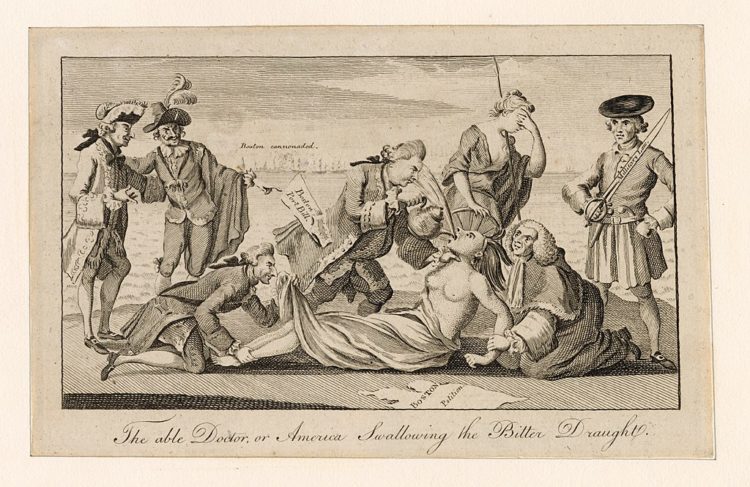Two hundred and forty-six years ago, the British Empire was reeling mad at the people of Massachusetts. And fed up with the hotheads from the Colonies, they were going to show all of them that the Crown had parliamentary authority over them and would reverse the trend of resistance coming from America.
In March of 1774, the British parliament passed the Coercive Acts, known as the “Intolerable Acts” in the thirteen colonies. What they’d hoped to use to reassert their authority in America, only drove a deeper wedge between themselves and the Colonies. The result would be that about a year later the American Revolution would flare-up.
In the late 1700s, the people of the thirteen colonies considered themselves Englishmen but many were growing disillusioned with the policies of the British parliament. They were also becoming increasingly frustrated with what they felt was “taxation without representation.”
After the Seven Years War, the British Empire was deep in debt and in need of more cash. They felt that the Colonists needed to pay their share in maintaining the Crown. The parliament enacted a series of taxes, levied on the Colonies, to force them to pay what it was perceived as their fair share. However, the prevailing feeling in the colonies was the opposite.
Many of the colonists felt that these taxes were violations of their proper rights as Englishmen. They argued that since they had no voice in parliament, the Crown had no right to levy specific taxes on them. The ensuing protests forced the repeal of the Stamp Act, but parliament was steadfast in its belief that the British Empire had the right to legislate for the Colonies “in all cases whatsoever,” as was reflected in the Declaratory Act of 1766.
The Massachusetts Bay Colony and the people of Boston were a constant thorn in the side of the Empire and things began to get violent. In March of 1770, several people set upon a lone British sentry which led the way to the bloody killing of several Boston citizens by British soldiers.
The British passed the Tea Act and although it made British tea cheaper for the colonists, it gave a monopoly to the British East India Company. A group of colonists, called the Sons of Liberty, decided to act. They dressed up as Indians and dumped 342 chests of tea into Boston Harbor on December 16, 1773. This became known as the Boston Tea Party.
When parliament learned of this, they were incensed. They passed four acts, three of which were designed to punish the people of Massachusetts for the destruction of Crown property. These acts were known as the Coercive Acts.
The Boston Port Act – This act closed the port of Boston until the colonists paid for the tea thrown in the harbor and the king was satisfied that order had been restored.
The Massachusetts Government Act – This act unilaterally took away Massachusetts’s charter. Under the Government Act, nearly every position in the colonial government was to be appointed by either the governor, parliament, or the king. The act also limited town meetings in Massachusetts to one per year, unless the governor called for one.
The Administration of Justice Act – This act effectively gave British officials total diplomatic immunity to any act they committed in Massachusetts. They were basically immune to any criminal prosecution in the colony. It also allowed the Royal governor to order trials of accused royal officials to take place in Great Britain, or elsewhere within the Empire, if he decided that the defendant could not get a fair trial in Massachusetts.
Already have an account? Sign In
Two ways to continue to read this article.
Subscribe
$1.99
every 4 weeks
- Unlimited access to all articles
- Support independent journalism
- Ad-free reading experience
Subscribe Now
Recurring Monthly. Cancel Anytime.
The Quartering Act – This act applied to all of the thirteen colonies and not just Massachusetts. It sought to create a more effective method of housing British troops in America. The Quartering Act allowed a governor to house soldiers in available buildings if suitable quarters were not provided.
(A common persistent myth of the American Revolution was that this act was designed to force colonists to house British soldiers in their private homes but historians have debunked this in recent years: It was designed to house British soldiers in unoccupied buildings.)
The parliament had hoped that the Coercive Acts would isolate the hotheads from Massachusetts and force the other colonists to accede to parliamentary rule. However, this calculated risk had the opposite effect. Not only did many colonists rally to the cause of Massachusetts but they also drafted members for a Continental Congress. By September 1774, the First Continental Congress met in Philadelphia.
Events were thrusting both parties towards an inevitable clash. In April of 1775, the “shot heard ‘round the world” took place on Lexington Green and the resultant battles of Lexington and Concord saw the beginning of actual combat between the Colonists and the British Empire. The American Revolution had begun.










COMMENTS